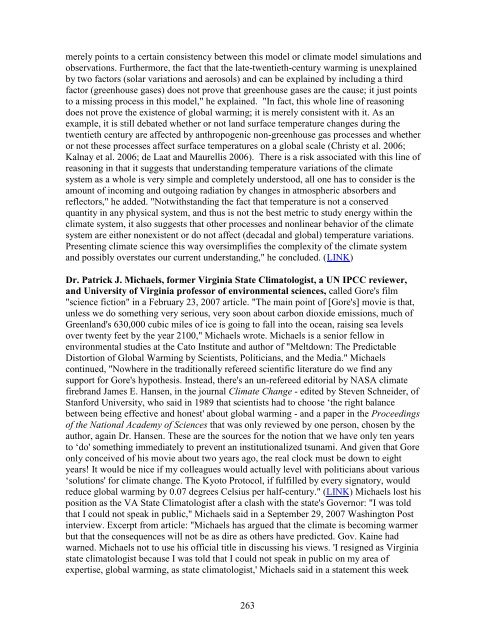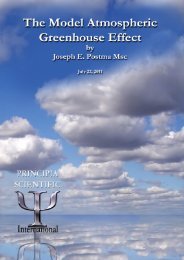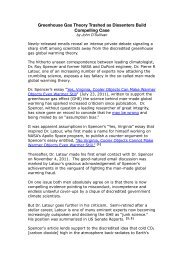Than 1000 International Scientists Dissent Over Man-Made Global ...
Than 1000 International Scientists Dissent Over Man-Made Global ...
Than 1000 International Scientists Dissent Over Man-Made Global ...
You also want an ePaper? Increase the reach of your titles
YUMPU automatically turns print PDFs into web optimized ePapers that Google loves.
merely points to a certain consistency between this model or climate model simulations and<br />
observations. Furthermore, the fact that the late-twentieth-century warming is unexplained<br />
by two factors (solar variations and aerosols) and can be explained by including a third<br />
factor (greenhouse gases) does not prove that greenhouse gases are the cause; it just points<br />
to a missing process in this model," he explained. "In fact, this whole line of reasoning<br />
does not prove the existence of global warming; it is merely consistent with it. As an<br />
example, it is still debated whether or not land surface temperature changes during the<br />
twentieth century are affected by anthropogenic non-greenhouse gas processes and whether<br />
or not these processes affect surface temperatures on a global scale (Christy et al. 2006;<br />
Kalnay et al. 2006; de Laat and Maurellis 2006). There is a risk associated with this line of<br />
reasoning in that it suggests that understanding temperature variations of the climate<br />
system as a whole is very simple and completely understood, all one has to consider is the<br />
amount of incoming and outgoing radiation by changes in atmospheric absorbers and<br />
reflectors," he added. "Notwithstanding the fact that temperature is not a conserved<br />
quantity in any physical system, and thus is not the best metric to study energy within the<br />
climate system, it also suggests that other processes and nonlinear behavior of the climate<br />
system are either nonexistent or do not affect (decadal and global) temperature variations.<br />
Presenting climate science this way oversimplifies the complexity of the climate system<br />
and possibly overstates our current understanding," he concluded. (LINK)<br />
Dr. Patrick J. Michaels, former Virginia State Climatologist, a UN IPCC reviewer,<br />
and University of Virginia professor of environmental sciences, called Gore's film<br />
"science fiction" in a February 23, 2007 article. "The main point of [Gore's] movie is that,<br />
unless we do something very serious, very soon about carbon dioxide emissions, much of<br />
Greenland's 630,000 cubic miles of ice is going to fall into the ocean, raising sea levels<br />
over twenty feet by the year 2100," Michaels wrote. Michaels is a senior fellow in<br />
environmental studies at the Cato Institute and author of "Meltdown: The Predictable<br />
Distortion of <strong>Global</strong> Warming by <strong>Scientists</strong>, Politicians, and the Media." Michaels<br />
continued, "Nowhere in the traditionally refereed scientific literature do we find any<br />
support for Gore's hypothesis. Instead, there's an un-refereed editorial by NASA climate<br />
firebrand James E. Hansen, in the journal Climate Change - edited by Steven Schneider, of<br />
Stanford University, who said in 1989 that scientists had to choose ‗the right balance<br />
between being effective and honest' about global warming - and a paper in the Proceedings<br />
of the National Academy of Sciences that was only reviewed by one person, chosen by the<br />
author, again Dr. Hansen. These are the sources for the notion that we have only ten years<br />
to ‗do' something immediately to prevent an institutionalized tsunami. And given that Gore<br />
only conceived of his movie about two years ago, the real clock must be down to eight<br />
years! It would be nice if my colleagues would actually level with politicians about various<br />
‗solutions' for climate change. The Kyoto Protocol, if fulfilled by every signatory, would<br />
reduce global warming by 0.07 degrees Celsius per half-century." (LINK) Michaels lost his<br />
position as the VA State Climatologist after a clash with the state's Governor: "I was told<br />
that I could not speak in public," Michaels said in a September 29, 2007 Washington Post<br />
interview. Excerpt from article: "Michaels has argued that the climate is becoming warmer<br />
but that the consequences will not be as dire as others have predicted. Gov. Kaine had<br />
warned. Michaels not to use his official title in discussing his views. 'I resigned as Virginia<br />
state climatologist because I was told that I could not speak in public on my area of<br />
expertise, global warming, as state climatologist,' Michaels said in a statement this week<br />
263





